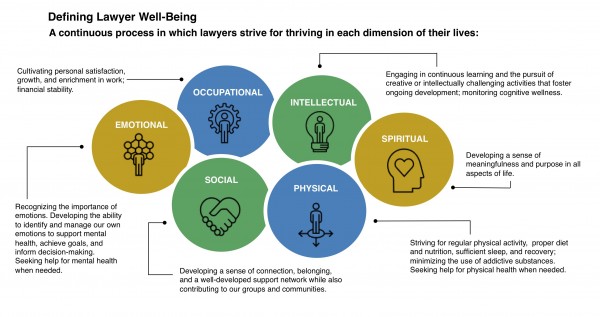If someone had told you that law was the most stressful profession, that lawyers struggle to find meaning in their work, and that lawyers score low on measures of happiness, would you still have gone to law school?
Many of us encountered a large gap between what we thought practicing law would be like and the reality. Notions of saving the world and glamour were displaced with mind-numbing detailed tasks interspersed with moments of sheer panic, and we didn’t have time to even think about whether we were happy.
According to a recent article in the ABA Journal, law is the most stressful occupation. This is based on data from the US Time Use Study conducted by the Bureau of Labor Statistics. I wasn’t able to find a copy of the time use study itself, but I found greater detail about the survey results.
White collar jobs were generally more stressful than blue collar jobs. And the least stressful jobs--lumberjacking and farming—involve physical hazards, with high reported levels of pain while working.
The Time Use Study used a six-point rating system where 6 is the highest score. For desirable values like happiness and meaning, we would want to see a high numerical score, but for a negative value like stress, a 6 would denote a high level of stress. Perhaps the ideal job would be high in both happiness and meaning and low in stress.
Agriculture, forestry and logging was the job category with the highest happiness score (4.4), the highest meaningfulness score (5.2), and the lowest stress score (1.9.), but how many of us would trade in our briefcases for chain saws? Or our polished shoes for work boots? Something in us self-selected for tidy, indoor work—and we were willing to take a decrease in happiness and meaning and an increase in stress for this privilege.
The Washington Post generated an excellent chart showing stress, happiness and meaning ratings of a range of job categories—click here to see where law, as part of the Professional, Scientific and Technical job category, ranked.
The recent National Study on the Psychological Health Determinants for Canadian Legal Professionals identified that many lawyers would like to leave law and that they regret their decision to go to law school. However, there are steps we can take to decrease stress and increase happiness and meaning.
We can’t remove stress from legal work entirely—but we can look at how we feel stress personally and what triggers our stress response. Different types of law jobs have different types of stress. We are not all the same and something that some lawyers find stressful—say, public speaking—is not stressful for others. Sometimes, we can change the type of law we practice or how it is practiced rather than leaving law altogether.
We can also look at how we spend our time and where we spend it apart from work. The US Time Usage Study evaluated activities and locations, as well as for occupations, happiness and meaning. Being outdoors (not at home) was the second most meaningful place (behind places of worship.)
Religious and spiritual activities ranked highest for happiness and meaning, and lowest for stress, followed by sports, exercise and recreation.
Putting these threads together, can lawyers generate more happiness and meaning, potentially offsetting negative stress, by exercising outdoors or perhaps by attending religious or spiritual events outside? Perhaps Assist should hold Walks for Wellness more often than once per year! And lawyers should not fear the disapproval of their secular colleagues—attending faith and spiritual events in places of worship is an effective antidote to stress (and spirituality is a dimension of well-being in and of itself.)

When I was a young lawyer, documents were generally sent between law firms by mail, courier or fax. Truly urgent documents might be delivered by an articling student. But sometimes a lawyer would decide to walk over to another lawyer’s office with documents as a chance to get out of the office and enjoy some fresh air and usually to have a short chat with the other lawyer. There is no doubt that technology has enhanced the speed at which we can produce and deliver our work, but exercise, fresh air and sociability can be lost.
Besides houses of worship and being outdoors, other places associated with happiness include: visiting someone else’s home or going out to a restaurant or bar, being on a bicycle or in a car, gym or health clubs, stores or walking. Your own home and yard followed this group—I may be an introvert, but being in my house with my dog is near the top of my list! Being in one’s workplace ranked just ahead of going to the bank.
The activities and locations that generate happiness and meaning will be subjective, but going to your happy place and doing an activity that you enjoy may be a way of countering stress.
While some legal work may involve righting wrongs with life-changing impact, most of our work is more mundane. But that doesn’t mean that it doesn’t have meaning. Some lawyers find meaning in the fact that they are supporting their families, and others consciously engage in activities like mentorship to add meaning.
What I like about studies like the Time Usage Study is that they normalize the idea of looking at components of lives and assessing them for stress, happiness and meaning, reinforcing the idea that you can decrease stress and increase happiness and meaning by making conscious choices about how and where to spend your time. Lawyers don’t have to merely sigh and accept the fact that they are in the most stressful profession—instead, we can recognize that we are highly stressed at work and that we should seek out low stress activities that we find meaningful and that make us happy. We need to give ourselves permission to move beyond misery and pursue happiness!
The leading work on lawyer happiness was conducted by Professor Larry Krieger, who spoke at the Well-Being in Practice Summit last October. He found that the factors most linked to lawyer happiness were all intangibles:
- Autonomy/integrity/authenticity
- Relatedness
- Competence
- Internal motivation
- Autonomy Support
Money had a small correlation with happiness thought to be connected with not having financial problems and debt. Making partner (or law review for law students) was neutral for happiness.
My take is that we, as a profession, have been looking for happiness in all the wrong places—external validation and prestige—when happiness come from the inside.
Are you seeking more happiness and meaning in your work and world? Assist’s professional counsellors can help you assess where you are relative to where you want to be, and can help you map out a path. Remember that we are here for you.
Wishing you happiness and meaning, |
|
